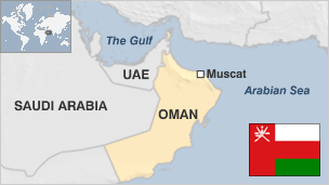
Facts and stats about Oman
- Agriculture 117
- Background 9
- Conflict 2
- Cost of living 53
- Crime 84
- Culture 15
- Economy 2639
- Education 638
- Energy 563
- Environment 203
- Geography 82
- Government 157
- Health 249
- Import 1
3.15 million
Population. Ranked 136th in 2013.
$23,132.94
GDP per capita. Ranked 39th in 2011.

309,500 sq km
Sq. km. Ranked 65th in 2008.
A former commerce minister (Mohammed al-Khusaibi) has been sentenced to three years in prison for corruption. He was fined $2 million. The senior official was found culpable of giving bribes worth $1 million to a former transport ministry undersecretary, Mohammed al-Amri. This payoff was associated with the airport development in Muscat. The undersecretary was meted a three-year prison sentence on top of a $3.1 million fine. Khusaibi is the most senior official to be convicted as part of a campaign against corruption in the sultanate. People have been detained in Oman due to labour law contravention. In fact, government authorities have been going hard against illegal work practices.
Compared to neighbouring Saudi Arabia, there is inadequate media hype about what has been going on in Oman. Majority of news articles are “praise releases and not objective news stories.” However, many negative incidents are not being reported accurately. Oman is confronted with political and economic difficulties that may not improve at all in the coming years. As an example, the sultanate's major oil reserves continue to decrease. The growth of population does not slow down. Political problems are not being addressed properly. The government seems to give little attention to the fact that these issues should be addressed straight away. http://digilib.gmu.edu/jspui/bitstream/1920/3031/1/Assessing%20Political%20Stability%20of%20Oman.pdf
Surprisingly, Oman has one of the most highly educated and most progressive political leaders in the Arab world. Sultan Qaboos bin Said al Said has mature liberal values. When the Arab Spring generated mass actions in the capital of Muscat as well as other urban areas, the Sultan cleverly allowed demonstrations to go on. When everything has died down, the Sultan strengthened the elected Shura Council. He sacked the old ministers and replaced them with young and progressive thinking individuals. He ordered the arrest of some radicals. He did this in a way that while the authorities were heavily criticized, his own status and power were not visibly affected. He came out in a better position and got more respect from other nations compared to other leaders in the Middle Eastern region.
jaacosta47 25 May 2014